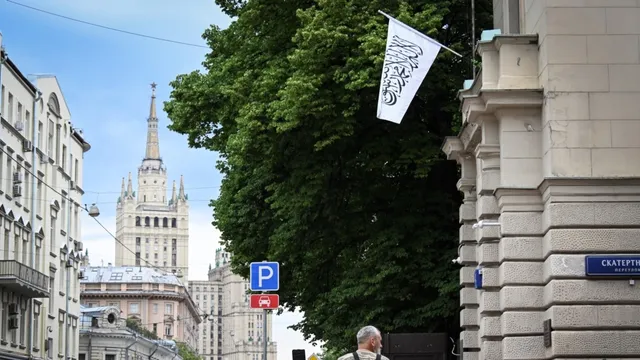
Russia recognizes Taliban government in historic move
2025-07-05 09:05- On April 4, 2025, Russia announced its formal recognition of the Taliban government in Afghanistan.
- The Taliban has sought international recognition since regaining control in August 2021.
- Russia's decision marks a significant shift in diplomatic relations that could impact geopolitical dynamics.
Express your sentiment!
Insights
On April 4, 2025, Russia announced its formal recognition of the Taliban government in Afghanistan, a significant diplomatic shift since the group took power in August 2021. This decision followed the removal of the Taliban from Russia's list of outlawed organizations, a move that highlights a change in Russia's foreign policy approach toward Afghanistan. The Russian Foreign Ministry confirmed the receipt of credentials from Afghanistan's newly appointed Ambassador, Gul Hassan Hassan, indicating a willingness to foster closer ties between the two nations. Afghanistan's Foreign Ministry hailed this development as a historic step, with Taliban Foreign Minister Amir Khan Muttaqi referring to it as an example for other countries. The recognition by Russia comes during a time when the Taliban seeks international recognition and economic support to rebuild the war-torn nation. Despite the controversial nature of the Taliban's governance, particularly regarding human rights violations and restrictions on women, Russia's engagement signals an increasing acceptance of the group in the international arena. There is a growing necessity for Russia to stabilize the region and counter threats from other terrorist organizations, as articulated by Russian officials. This shift could shape future relations in Central Asia and influence geopolitical dynamics going forward. As the only country to recognize the Taliban officially, Russia's role may attract mixed sentiments globally due to the Taliban's history and continuing global isolation.
Contexts
The current status of Taliban governance in Afghanistan has been characterized by a range of challenges and developments since their return to power in August 2021. The Taliban's re-establishment of control has led to significant shifts in the political landscape, with a focus on consolidating power and implementing their interpretation of Islamic law. However, the governance model has been met with both internal resistance and international scrutiny. The Taliban has faced criticism for its human rights record, particularly concerning the rights of women and girls, who have seen the re-imposition of restrictions that curb their access to education, employment, and public life, resulting in a notable reduction in freedoms compared to the previous years under the former government. This has raised concerns among various humanitarian organizations and governments regarding the ongoing human rights situation in the country. Economically, Afghanistan continues to grapple with severe challenges, including widespread poverty, unemployment, and a lack of access to basic services. The international community has largely withheld recognition of the Taliban administration, leading to a significant reduction in foreign aid, which previously supported a large portion of the Afghan economy. The humanitarian crisis has worsened, with millions facing food insecurity, lack of healthcare, and limited access to education. The Taliban has sought to negotiate with international actors to unlock funds and resources but has faced conditional offers that tie support to improvements in governance and human rights. The Taliban's internal governance structure has indicated attempts to establish a more formalized administration, with the establishment of ministries responsible for various sectors. However, the governance remains largely centralized and aligned with tribal affiliations, which poses challenges in addressing the diverse needs of the Afghan population. Stability has been challenged by the ongoing threat of resistance movements, including elements that maintain anti-Taliban sentiments and engage in armed opposition, such as the National Resistance Front. Such dynamics complicate efforts towards long-term stability and sustainable governance in the region. In summary, while the Taliban has solidified its control over Afghanistan, the government faces profound governance challenges, including the need for recognition, financial aid, and adherence to international human rights standards. The situation remains fluid, with ongoing humanitarian crises and political complications that will likely define the future of governance in Afghanistan. Without significant changes in policy, both internally and from the international community, the prospects for improved conditions for the Afghan populace remain uncertain.